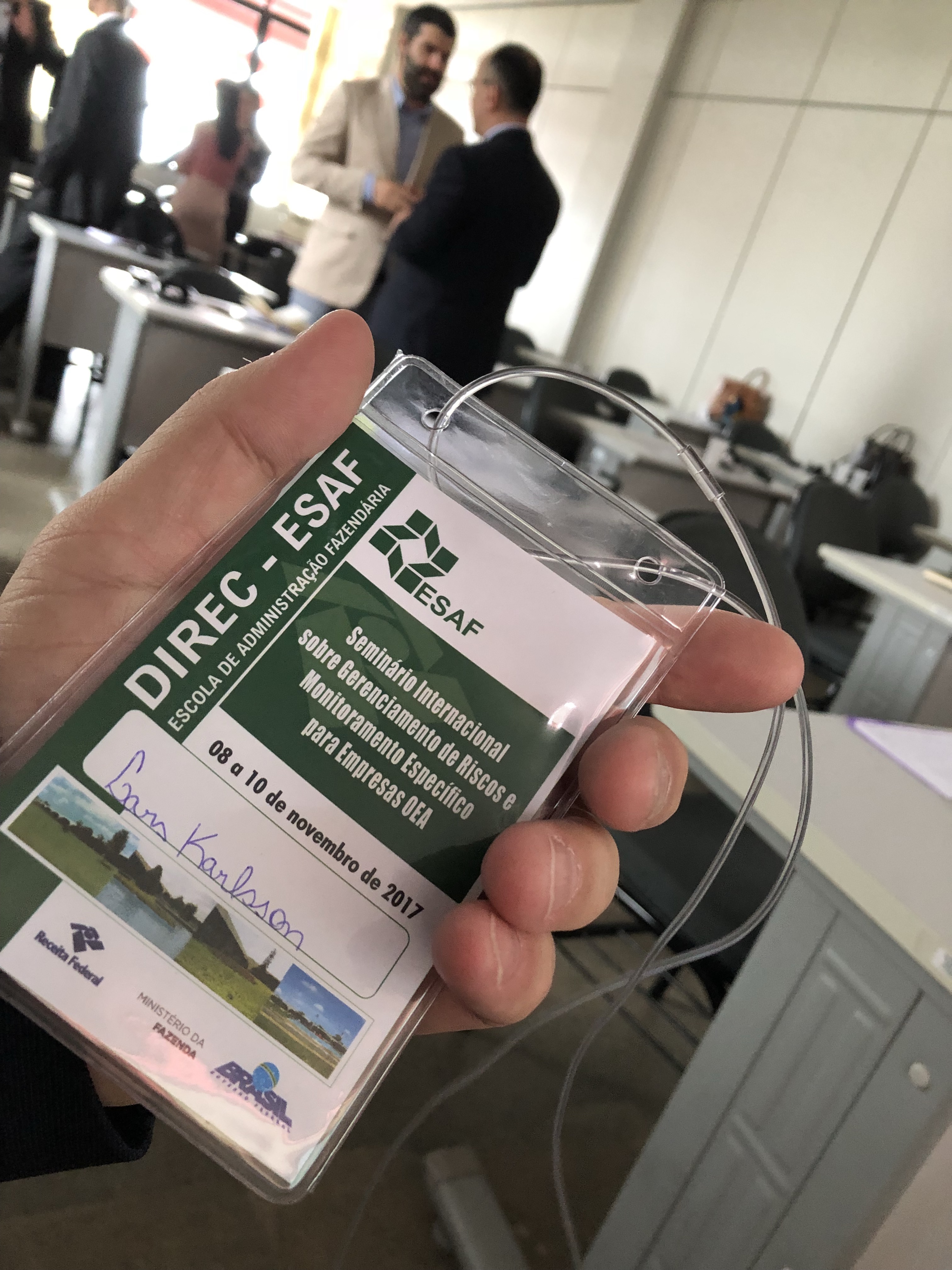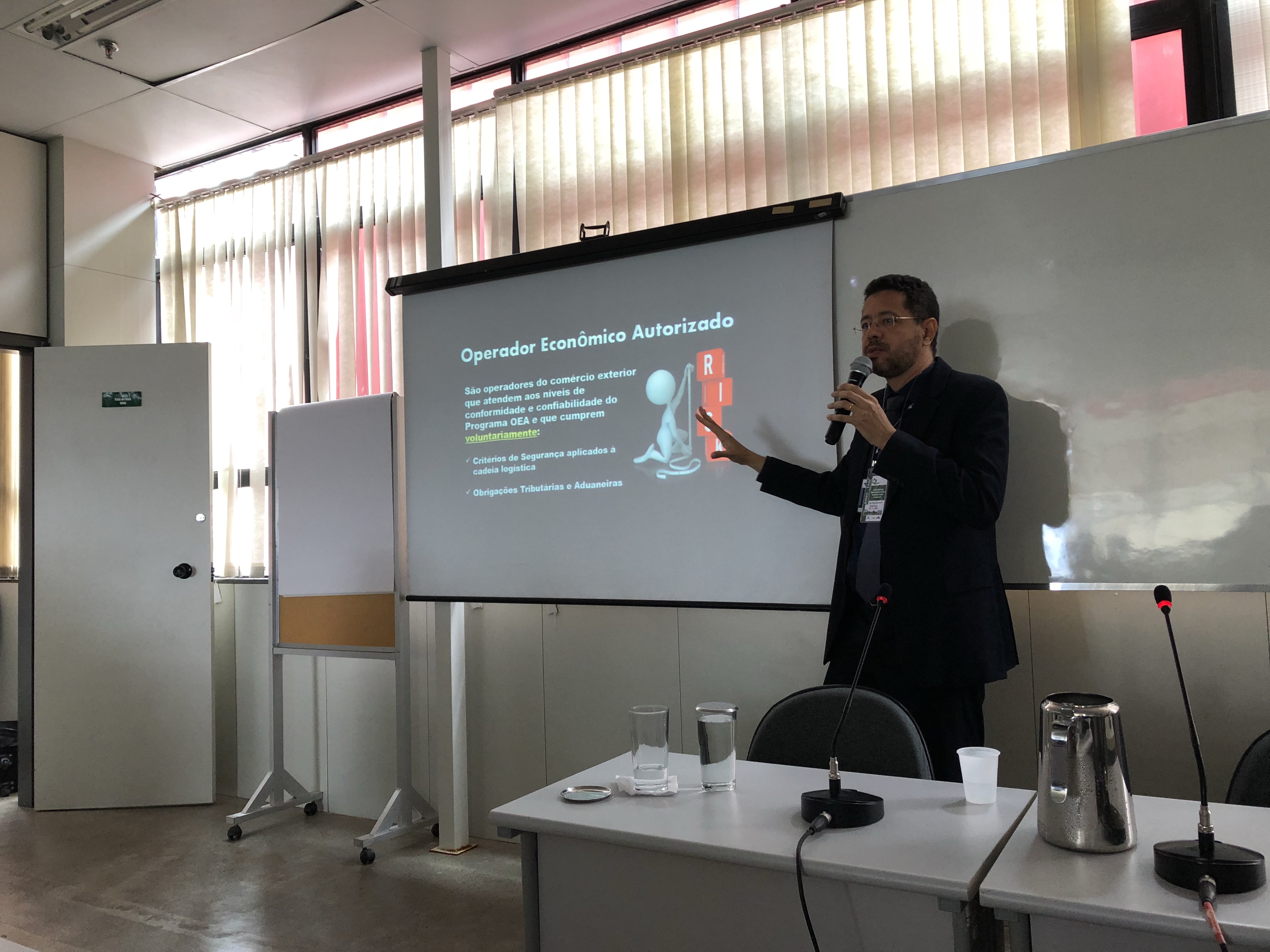I am back in Brasilia for the last workshop of AEO Brazil Project. This is the 4th year of the project and we are this time having a discussion on how risk management, AEO and PCA can work together to improve all parts of the Federal Revenue Agency (Receita Federal) business.

I am very impressed about how Receita Federal has implemented the AEO Brazil programme. It is one of the best, most modern and innovative programmes in the world and on the first day of the worlshop it was great to hear how programme is evolving.

Thisbis journey we started a long time ago and we are now starting to see the results in better processes and real benefits for companies.

There is a maturity in the management and the AEO team that is very promising for the future.

The new Risk Management project is also a very good initiative. In combination with AEO Brazil and the Single Window, it will increase the position of Brazil in international indexes, like World Bank Doing Business Review and World Economic Forums, Göobal Competitiveness Index.

I am very happy for having being involved in the design, development and implementation of this state-of-the-art AEO programme. AEO Brazil is changing Brazil for the better.
This post is about rules for travelling or really about rules for travellers. There are naturally many rules around travelling, especially if tou travel by air. However I am not refereing to all those official rules but instead some of the things that a traveller should think about when travelling.

I am an experienced traveller. I started to travel when young and I have been travelling extensively both professionally and privately the last 35 years. Preferably by air, I am not a fan of trains and busses – but do go with car when possible.
Today I have visited 169 countries around the world. Yes, you read correctly 169. And I do count. I started counting already in the 80s not knowing where life would take me to where I am today. So I do have some experience. There are som unwritten – until now – rules that people should be aware when travelling to make the journeys quicker and more comfortable for everybody.

If you think about it, it is kind of a strange and remarkable thing that we assembly several hundred people to move over territory in a steel tube, so when we do it – please think of these 10 things;
1. Never use the back of the seat in front of you as a support handle for getting up. Somebody is sitting there, not knowing that you are planning to use his/her seat as a merry-go-round at a mall making it move forward as if it was an Apollo rocket making a lift-off for space
2. Never were a backpack in a plane. Or not at all to my mind (I am not a big fan lf backpacks). If you absolutely must use a backpack in an airplane take it off and carry it in front of you. A backpack does not disappear just beacuse you have it on your back and when moving it hits people already sitting down in aisle seats (I can’t keep track of hiw many tlmes I have had a backpack in my face.
3. Never close the storage cabins above the seats. The airplane staff will do that. If you close it, when full, every passanger comkng after you will stop and opennit to check for soace which willd elay the flight.
4. Don’t stand still on walking ways (stairways) in airports. They are there for moving people in a hurry faster, not to be blocked by people cruising the airport and using the walking ways out of laziness.
5. Prepare for security. This is why there are signs, instruction movies, information biars every five meters of the line when queing. I am still amazed by people 15 years down the lane since airport security where introduced in a more sytructured manner, who have no clue what to do when arriving at the actual security check after waiting forever. ”Do I need to take up my computer?”, ”mobile too? I had no idea”, ”Can’t I have fluids? I have them all over in my carry-on”, ”no coins in my pockets?”….
6. Use common sense when boarding and leaving a plane. You don’t have to stand in the aisle to put your thingsbin the cabin. Take a step aside at your row and let other passangers going far back in the plane to enter. The bagage can be stored from there. I have done ot thousands of times. Then we all leave and arrive earler. You are not in a hurry? I am and so are mostbof your fellow passangers.
7. Don’t hit the back of the seat in front of you. There are few thins more ennoying than a passanger behind you moving the tray up and down or constantly hitting the interactive movie screen – when you try to sleep.
8. If you are travelling with children, it is allowed to tell them to behave. I did when travelling with mine. It worked very well as a concept. I love and adore children, but an airplane cabinnis mot an amusement park.
9. Respect your travelling neighbor. Somebody sitting beside you in an airplane for a few hours, which is the only time you will cross each others paths in a lifetime, might not be interested in your work, dinner plans, family affairs, seightseeing trips or business meetings. Just saying.
10. If you decide to stay seated in an aisle seat uppn arrival, waiting for everybody to leave the airplane – first check if the people sitting beside you are in a hurry. Otherwise they will be angry with you. If you still stay in your seat to relax and take it easy while others want to leave quickly, please don’t suddenly change your mind to blick the aisle while unprepared taking your luggage, getting dressed, combing your hair. If you stay seated, remain seated until the people with short connections have left the plane.
Bonus advise:
- Never eat on planes if you can avoid it. I never had a decent meal in my life on an airpl
- Don’t drink while flying. Genuinely a bad idea for more reasons and I care to explain.
- Don’t sleep on dayflights. You will not be tired upon arrival and will thus stay up all night and call it ’jetlag’. It is not jetlag, it is bad planning. Always adjust to your arrival timezone before you leave on your journey. That way you will get into the new time quickly and you will avoid jetlag.
Kofi Annan served for 10 years as secretary-general of the United Nations. In the time since, he has dedicated himself to the fight against tax evasion and the looting of Africa. It’s a tough battle against multinational corporations and greedy leaders.

Mr. Annan, why is Africa so poor?
Kofi Annan: Africa isn’t poor. It’s a rich continent with many, many poor people. Around $160 billion dollars flow into Africa each year – inflow through transfers made by Africans living outside the continent and in the form of aid assistance. But we lose over $200 billion in the outflow. So, in the end, we are a net transferor of resources out of Africa to the rest of the world.
In your 2013 Africa Progress Report, you shed light on the fact that around $1.36 billion was lost by the Democratic Republic of Congo between 2010 and 2012 in the form of mining rights for copper and cobalt that were sold to firms based on the British Virgin Islands at prices far below their actual value. That would have been enough money to cover Congo’s health and education budgets for two years. How is something like that even possible?
The problem begins with the contracts governments sign with the multinationals. Some countries are so keen to attract multinationals that they offer indefensible concessions to try and attract them. These companies also exploit that. They will tell you, for example: We need to get our investments back before we begin sharing the profits. Sometimes, as part of the concession, they’re not even required to pay taxes for many years, which is really wrong.
In Congo, we have the classic example of the country’s elites, foreign firms and investors colluding to jointly loot the country. Who is primarily to blame for this?
It takes two to tango. The African officials who are signing away their country’s resources at an almost giveaway rate in the expectation that they will get something are really betraying their people and the trust they have put in them. This has a real and direct impact. It takes development and food away from people. The multinationals and the investors also have to know that they have a certain responsibility and obligation. They don’t need a government law or necessarily a strong government in place for them to do what is right – legally, professionally and morally. Sometimes, they even go to the extent of telling you: If we don’t pay the bribe, the competitor will pay it – and take the business away from us. This is something I don’t accept.
What can be done about it?
The only way to stop this sort of game is to push for transparency. Transparency is a powerful tool. We should get the companies and the governments to publish the contracts that have been signed, what the companies earned and how much they paid to the government in taxes. The public also needs to know what the government did with the money.
Here is a link to thw entire article Paradise Papers: Kofi Annan on corruption in Africa
Source: This interview was conducted By Tobias Zick for Suddeutche Zeitung 05. November 2017






You must be logged in to post a comment.